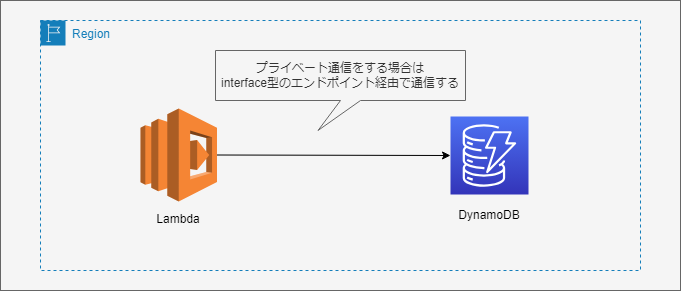はじめに
Lambdaを使ってDynamoDBへのデータの追加・取得・更新・削除をするハンズオンを紹介します。
過去にDynamoDBについて解説記事を作成したので以下を参考にしてください。
環境構成
以下の構成で構築します。

コメントでもいれていますが、LambdaとDynamoDBをインターネット経由で通信せずに、VPC内部でプライベートな通信をする場合は、DynamoDBのinterface型のVPCエンドポイントを生成してください。
今回はデータの取得にScanコマンドを使っています。
Scanコマンドは全件取得コマンドになるので、性能面やコスト面では適していないです。
実際に利用する場合はGSI(グローバルセカンダリインデックス)とQueryコマンドを使うなどで読み込み対象を絞ることを推奨します。
DynamoDBの設定
以下でDynamoDBのテーブルを作成してください。
- テーブル名:任意
- パーティションキー:id
- ソートキー – オプション:今回は指定なし
- テーブル設定:デフォルト設定
Lambda関数の設定
以下で関数を作成してください。(DynamoDBと同じリージョンに作成してください)
- 関数名:任意
- ランタイム: Node.js 20.x
- アタッチするIAMロールにDynamoDBのアクセス権を付与
- レイヤー:AWS レイヤー > AWSLambdaPowertoolsTypeScriptV2(uuidが入っていそう)
- 環境変数
- DYNAMODB_TABLE:作成したDynamoDBのテーブル名
- コード
import { DynamoDBClient, ScanCommand, PutItemCommand, UpdateItemCommand, DeleteItemCommand } from '@aws-sdk/client-dynamodb';
import { v4 as uuidv4 } from 'uuid';
// 環境変数からテーブル名を取得
const TABLE_NAME = process.env.DYNAMODB_TABLE || '';
const REGION = process.env.AWS_REGION || '';
const dynamoDbClient = new DynamoDBClient({ region: REGION });
// レスポンスを作成するヘルパー関数
const createResponse = (statusCode, body) => {
return {
statusCode,
headers: {
'Content-Type': 'application/json',
},
body: JSON.stringify(body),
};
};
export const handler = async (event) => {
const method = event.httpMethod;
try {
switch (method) {
case 'GET':
return await getItems(event);
case 'POST':
return await createItem(event);
case 'PUT':
return await updateItem(event);
case 'DELETE':
return await deleteItem(event);
default:
return createResponse(405, { message: 'Method Not Allowed' });
}
}
catch (error) {
console.error(error);
return createResponse(500, { message: 'Internal Server Error' });
}
};
// GET /item: アイテムリストの取得
const getItems = async (event) => {
// クエリパラメータからlimitを取得(デフォルトは10)
const limit = event.queryStringParameters?.limit ? parseInt(event.queryStringParameters.limit, 10) : 10;
if (isNaN(limit) || limit <= 0) {
return createResponse(400, { message: 'Invalid limit parameter' });
}
const command = new ScanCommand({
TableName: TABLE_NAME,
Limit: limit, // 取得上限を指定
});
try {
const result = await dynamoDbClient.send(command);
return createResponse(200, result.Items || []);
}
catch (error) {
console.error('Error getting items:', error);
return createResponse(500, { message: 'Error getting items' });
}
};
// POST /item: アイテムの作成
const createItem = async (event) => {
const itemData = JSON.parse(event.body || '{}');
const itemId = uuidv4();
const command = new PutItemCommand({
TableName: TABLE_NAME,
Item: {
id: { S: itemId },
name: { S: itemData.name },
description: { S: itemData.description },
},
});
try {
await dynamoDbClient.send(command);
return createResponse(201, { message: 'Item created', id: itemId });
}
catch (error) {
console.error('Error creating item:', error);
return createResponse(500, { message: 'Error creating item' });
}
};
// PUT /item/{id}: アイテムの更新
const updateItem = async (event) => {
const itemId = event.pathParameters?.id;
if (!itemId) {
return createResponse(400, { message: 'Item ID is required' });
}
const itemData = JSON.parse(event.body || '{}');
const command = new UpdateItemCommand({
TableName: TABLE_NAME,
Key: {
id: { S: itemId },
},
UpdateExpression: 'SET #name = :name, #desc = :desc',
ExpressionAttributeNames: {
'#name': 'name',
'#desc': 'description',
},
ExpressionAttributeValues: {
':name': { S: itemData.name },
':desc': { S: itemData.description },
},
});
try {
await dynamoDbClient.send(command);
return createResponse(200, { message: 'Item updated', id: itemId });
}
catch (error) {
console.error('Error updating item:', error);
return createResponse(500, { message: 'Error updating item' });
}
};
// DELETE /item/{id}: アイテムの削除
const deleteItem = async (event) => {
const itemId = event.pathParameters?.id;
if (!itemId) {
return createResponse(400, { message: 'Item ID is required' });
}
const command = new DeleteItemCommand({
TableName: TABLE_NAME,
Key: {
id: { S: itemId },
},
});
try {
await dynamoDbClient.send(command);
return createResponse(200, { message: 'Item deleted', id: itemId });
}
catch (error) {
console.error('Error deleting item:', error);
return createResponse(500, { message: 'Error deleting item' });
}
};
- テスト
データ登録
イベント名:postItem
{
"httpMethod": "POST",
"body": "{\"name\": \"Test Item\", \"description\": \"This is a test description.\"}",
"headers": {
"Content-Type": "application/json"
},
"queryStringParameters": null,
"pathParameters": null
}
データ取得
イベント名:getItems
{
"httpMethod": "GET",
"queryStringParameters": null,
"headers": {
"Content-Type": "application/json"
},
"pathParameters": null
}
データ更新
※pathParameters.idには更新したいテーブルの項目のidを入力してください。
{
"httpMethod": "PUT",
"body": "{\"name\": \"Updated Test Item\", \"description\": \"This is an updated test description.\"}",
"headers": {
"Content-Type": "application/json"
},
"queryStringParameters": null,
"pathParameters": {
"id": "3c51ff32-da4a-4cc2-a17a-16fc97696f86"
}
}
データ削除
{
"httpMethod": "DELETE",
"headers": {
"Content-Type": "application/json"
},
"queryStringParameters": null,
"pathParameters": {
"id": "3c51ff32-da4a-4cc2-a17a-16fc97696f86"
}
}
実行結果
データ登録
{
"statusCode": 201,
"headers": {
"Content-Type": "application/json"
},
"body": "{\"message\":\"Item created\",\"id\":\"3c51ff32-da4a-4cc2-a17a-16fc97696f86\"}"
}
データ取得
{
"statusCode": 200,
"headers": {
"Content-Type": "application/json"
},
"body": "[{\"description\":{\"S\":\"This is a test description.\"},\"id\":{\"S\":\"a7bb141a-1129-4549-8ddc-999d5cc974b9\"},\"name\":{\"S\":\"Test Item\"}},{\"description\":{\"S\":\"This is a test description.\"},\"id\":{\"S\":\"1033652c-c8aa-4eca-a05c-7f27c27c8071\"},\"name\":{\"S\":\"Test Item\"}},{\"description\":{\"S\":\"This is a test description.\"},\"id\":{\"S\":\"3c51ff32-da4a-4cc2-a17a-16fc97696f86\"},\"name\":{\"S\":\"Test Item\"}}]"
}
データの更新
{
"statusCode": 200,
"headers": {
"Content-Type": "application/json"
},
"body": "{\"message\":\"Item updated\",\"id\":\"3c51ff32-da4a-4cc2-a17a-16fc97696f86\"}"
}
データの削除
{
"statusCode": 200,
"headers": {
"Content-Type": "application/json"
},
"body": "{\"message\":\"Item deleted\",\"id\":\"f47ac10b-58cc-4372-a567-0e02b2c3d479\"}"
}
AWSの資格を取得してスキルアップしたい方
今回のハンズオンで紹介したLambdaとDynamoDBの結合構成はサーバレスアプリケーションとして代表的な構成で、AWS認定資格の問題にもよく出題されます。
より詳しく知りたい方は参考書や問題集で知識を深めることができます。
問題集は知識の確認ができるだけではなく、多くの「事例紹介集」としての役割もあると考えてます。問題を解くことで一般的なAWSの設計スキル、トラブル時を想定した設計スキルなどを身に着けることができます。
|
|
![[商品価格に関しましては、リンクが作成された時点と現時点で情報が変更されている場合がございます。] [商品価格に関しましては、リンクが作成された時点と現時点で情報が変更されている場合がございます。]](https://hbb.afl.rakuten.co.jp/hgb/409b1f55.a8245d67.409b1f56.7e505fdc/?me_id=1285657&item_id=12894091&pc=https%3A%2F%2Fthumbnail.image.rakuten.co.jp%2F%400_mall%2Fbookfan%2Fcabinet%2F01097%2Fbk4295018406.jpg%3F_ex%3D240x240&s=240x240&t=picttext)


